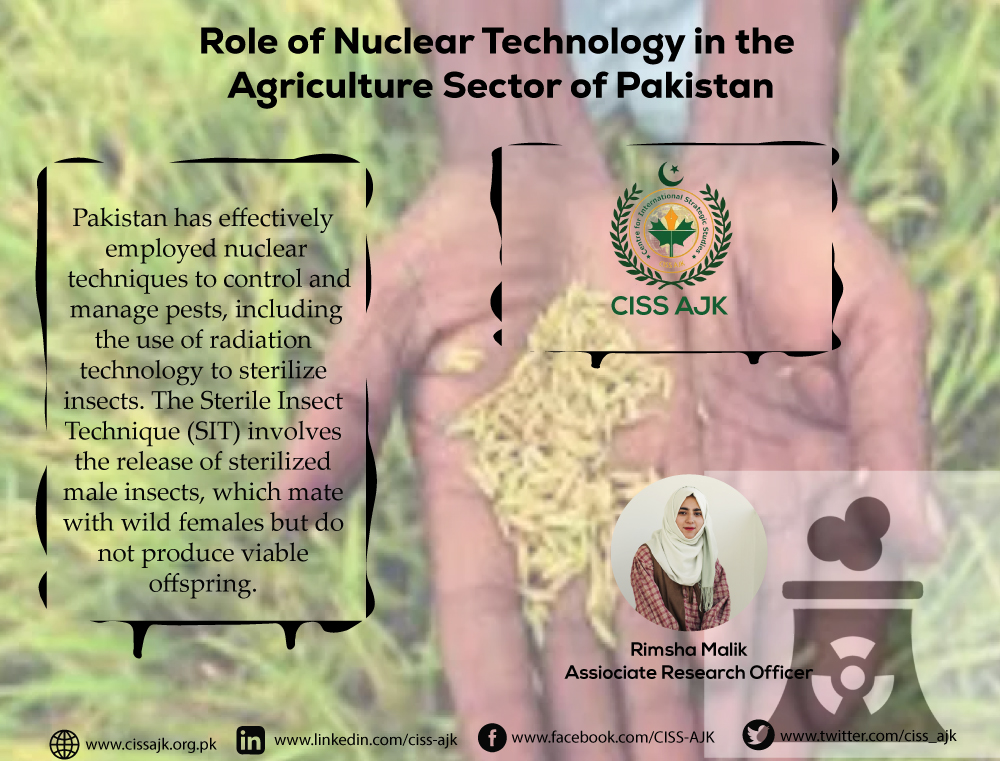589
Pakistan has emerged as a leading example of a country that effectively harnesses peaceful nuclear technology to drive advancements in its agriculture sector. Through the utilization of nuclear techniques, Pakistan has achieved remarkable progress in increasing crop yields, improving soil and water management, enhancing food security, and addressing agricultural challenges. In order to use nuclear technologies to address challenges of human security, the Pakistan Atomic Energy Commission (PAEC) created four agro and biotechnology institutes.

PAEC conducts nuclear research and development in the fields of agriculture, plant breeding, soil science, plant protection, plant physiology, and animal sciences. It is impressive what PAEC has accomplished with nuclear agriculture.The four institutions—Nuclear Institute for Agriculture (NIA), established in Tandojam, Sindh, in 1962; Nuclear Institute for Agriculture & Biology (NIAB), established in 1972; National Institute of Biotechnology & Genetic Engineering (NIBGE), established in Faisalabad, Punjab, in 1994; and Nuclear Institute for Food & Agriculture (NIFA), established in Peshawar, Khyber Pakhtunkhwa, in 1982—work in areas such as crop improvement, insect pest control, Numerous kinds of wheat, cotton, rice, mung bean, chickpea, lentil, sugarcane, castor bean, kinnow, sesame, tomato, and brassica have been created as a result of their study. These types have more nutritional content, are heat tolerant, resistant to insects and diseases, and yield more.
The major research and development institute of PAEC is PINSTECH, which ensures balanced research in peaceful uses of nuclear technology for the country’s socio-economic development.NIAB-78, a cotton variety developed by PAEC scientists, generated an additional income of Rs. 90 billion for Pakistan from its cultivation began in 1983 until the early 2000s. NIAB-78 revolutionized cotton production in Pakistan, covering almost 80 percent of cotton-cultivated areas in Punjab and Sindh. The increase in cotton production due to mutant varieties created by NIAB has added $6 billion to Pakistan’s national economy. Cotton and textile products make up 60 percent of Pakistan’s overall exports. By increasing cotton yield and quality, Pakistan can generate much-needed revenue and support the textile sector. Pakistani experts have also created 125 new crop varieties using nuclear technology, which has helped the nation’s funds grow by $7.4 billion. Pakistan is the fifth-largest cotton producer in the world, and cotton exports are extremely dependent on cotton production. Through mutation breeding techniques, the Food and Agriculture Organisation (FAO) and the International Atomic Energy Agency (IAEA) recently developed new cotton varieties that are more climate resilient and better adapted to the dangerous effects of climate change in collaboration with local partners. In fact, these new varieties currently account for 40% of Pakistan’s total cotton production. Due to this, the cotton yield increased in 2021–2022 from 7064 thousand bales to 8329 thousand bales of cotton, despite a decrease in the amount of cultivated land used for cotton production. This shows that nuclear technology can have a significant impact on the agriculture sector if given the necessary attention and financial support. Pakistan has effectively employed nuclear techniques to control and manage pests, including the use of radiation technology to sterilize insects. The Sterile Insect Technique (SIT) involves the release of sterilized male insects, which mate with wild females but do not produce viable offspring. This method has been successfully implemented to combat pests like fruit flies and moths, reducing their populations and minimizing crop losses without the need for chemical pesticides.
Pakistan has utilized nuclear techniques to improve soil and water management practices. Isotopic and nuclear-based hydrology techniques have been employed to assess water availability, understand groundwater dynamics, and optimize irrigation practices.These techniques involve the use of isotopes to trace the movement and availability of water in different soil layers, facilitating informed decision-making regarding water allocation, conservation, and efficient irrigation methods. By understanding water availability and optimizing irrigation practices, Pakistan has effectively combated water scarcity issues, improved water-use efficiency, and increased crop production. Pakistan’s effective utilization of peaceful nuclear technology has transformed its agriculture sector, bolstering crop productivity, soil and water management, pest control, and food safety. Through continued investment in research, collaboration, and knowledge transfer, Pakistan is poised to further enhance its agricultural development and contribute to global food security objectives.

The Author is associated with the Center for International Strategic Studies, AJ&K. She Tweets @RimshaM62719126

